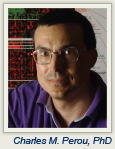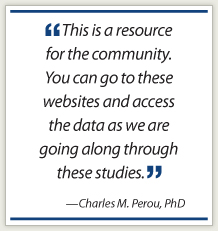 Charles M. Perou, PhD, the May Goldman Shaw Distinguished Professor of Molecular Oncology at the University of North Carolina, Chapel Hill, commented on the research being conducted by The Cancer Genome Atlas (TCGA) and the International Cancer Genome Consortium (ICGC).
Charles M. Perou, PhD, the May Goldman Shaw Distinguished Professor of Molecular Oncology at the University of North Carolina, Chapel Hill, commented on the research being conducted by The Cancer Genome Atlas (TCGA) and the International Cancer Genome Consortium (ICGC).
“The TCGA and ICGC efforts are providing the blueprint for what can be tested as possible biomarkers in the current, and next, generation of clinical trials. These projects are also showing us how common pathways are differentially altered in given tumor types vs others, and we are seeing tumor subtype–specific alterations that could have clinical relevance,” he told The ASCO Post.
“These broad and in-depth genomic characterizations of most common tumor types will soon reveal the frequent somatically mutated genes, and all the commonly deleted and amplified regions of the cancer genome.… In most cases, the tumors examined by the TCGA and ICGC are being used as the discovery engine to find the set of ‘genetic players’ for a given tumor type, which can then be used in future clinical trials,” Dr. Perou said.
 Translational Impact
Translational Impact
“These projects are also discovering new cancer-causing genes, or more commonly, finding that cancer-causing genes identified in one tumor type are also present in a tumor type not previously known to be influenced by this given gene. Some of these may also have clinical relevance,” he commented. “It is my hope that in the future, the TCGA and ICGC will directly study tumor samples from randomized clinical trials that are evaluating current and promising new therapeutics, thus making the translational impact even greater than it is today.”
The TCGA and ICGC findings are intended to be shared resources for the breast cancer research community, Dr. Perou added. “An important aspect of both of these studies is that the data coming from these studies is to be made publicly available in … near real time,” he explained. “So this is not a resource for those of us generating the data—this is a resource for the community. You can go to these websites and access the data as we are going along through these studies.” ■
Disclosure: Dr. Perou reported no potential conflicts of interest.

